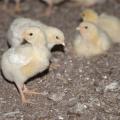Causes of pecking and cannibalism
Cannibalism is a prevalent problem in chicken and game bird flocks. It usually begins as simple pecking among the birds and escalates until it is out of control. There are many conditions that increase the likelihood that it will become a serious problem. The problem usually begins by innocent pecking during the establishment of a social order or by pulling of the feathers in certain cases. Some of the reasons for cannibalism are:
- Crowding birds - Correct by increasing the amount of space available for each bird.
- Provide plenty of feed and water - All birds should have access to feed and water at all times.
- Keep light intensity low - Bright lighting increases bird activity and cannibalism.
- Keep the house temperature comfortable - Hot house temperatures aggrivate birds and make them more irritable.
- Provide all dietary nutrients at recommended levels - Deficiencies of nutrients like methionine and salt will increase a craving for feathers and blood.
- Regularly treat birds for external parasites - Pests can stimulate birds to peck and injure the skin, resulting in cannibalistic frenzies.
- Remove all sick, weak, small, or odd colored chicks - Birds will attack and kill these chicks as a survival instinct, resulting in widespread cannibalism throughout the flock.
If the pecking and cannibalism problem can not be controlled by the recommended management practices, the last resort is debeaking. Many producers commonly remove portions of both the upper and lower beaks of chicks soon after hatching. This prevents future pecking problems. The debeaking procedure is accomplished by using a hot debeaking blade that cauterizes while cutting the beak. In young chicks, the beak is so soft that touching the beak to a hot metal blade usually removes enough beak to prevent cannibalism. Mature birds may need to have their beaks "trimmed" periodically to prevent cannibalism in older flocks.
Publications
News
BILOXI, Miss. -- Many cattle producers in Mississippi like Bobby Jones do not have access to a dedicated large-animal veterinarian.
Mississippi’s poultry took an estimated 23% loss in value in 2023; though production was strong, a failure to meet the previous year’s record high prices was responsible for the hit. Poultry generated an estimated $3.1 billion to Mississippi agriculture in 2023, down from the $3.9 billion generated in 2022.





